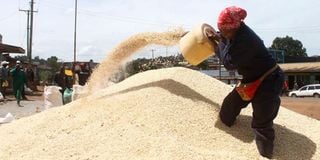Treasury extends duty-free maize imports by 2 months

Workers sort and weigh dry maize in Elburgon town, Nakuru County, on January 22.
The government has extended duty-free maize imports for two more months to allow maize importers to ship in the produce to ease shortage of the cereal that has pushed up the cost of maize flour.
National Treasury Cabinet Secretary Ukur Yatani in May suspended import tax on maize to increase imports from outside the East African Community (EAC) in a bid to ease pressure on maize flour prices.
Kenya is a net importer of maize, a staple food in the country, but has traditionally restricted imports to cushion local maize farmers but at a cost to consumers who are forced to pay a higher cost for maize.
Mr Yatani opened a three-month window for importers to bring in up to 540,000 metric tonnes of duty-free maize up to August 6.
The importers had complained that the initial window was too short to allow them to ship maize from overseas such as Mexico, arguing that the duty-waiver would achieve little as the ships loaded with the product would dock after the window had closed.
The CS has now extended the window for two more months until September 30 to allow maize importers who had ordered their produce time to bring it into the country.
“It is notified for the general information of the public that, upon recommendation by the Cabinet Secretary for Agriculture, the Cabinet Secretary for the National Treasury amends the Gazette Notice No. 5544 of May 9, 2022 by deleting the words “August 6, 2022” and substituting therefor the words “September 30, 2022,” said Mr Yatani in a gazette notice.
Kenya imports maize from the EAC — mostly Uganda and Tanzania — duty free but imports from countries that are not members of the EAC or the Common Market for Eastern and Southern Africa (Comesa) at 50 percent tariff.
The country has been hit by maize shortage this year due to low local production due to drought coupled with lower imports from overseas following the outbreak of the Russia-Ukraine war that affected global shipments of cereals.
The cost of a kilo of loose maize grain has shot up by 31.5 percent year-on-year between July last year and this year due to the maize shortage.
This has been worsened by a rise in the cost of other staple foods such as white rice, whose price has risen 13.4 per cent and Irish potatoes, whose cost has shot up 15.4 per cent during the same period.
The high food prices coupled with record-high fuel prices have pushed inflation to increase for the fourth month in a row to hit 8.3 per cent this month.





